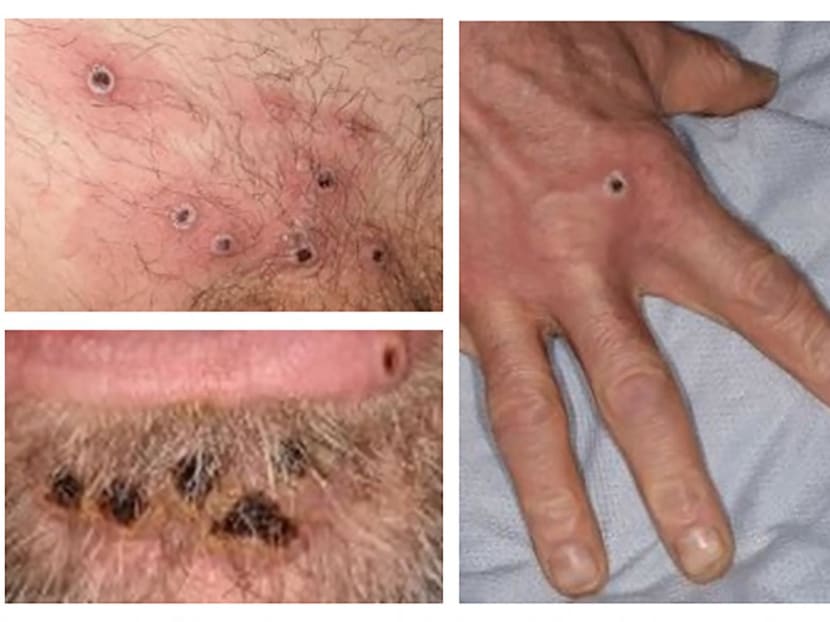Explainer: Why monkeypox is not a 'gay disease', yet the queer community needs to heed the health risks

- A study has found that 98 per cent of monkeypox cases are men who had sex with men
- This has fuelled the disease's association with the LGBTQ+ community
- However, infectious disease experts warned against stigmatising the disease with such individuals as it will only serve to further its spread
- Experts also said the key to controlling the disease is looking out for symptoms and seeking medical help
- LGBTQ+ rights groups told TODAY they are raising awareness of the disease, while emphasising its spread is not limited to men who have sex with men
SINGAPORE — A global outbreak of monkeypox is being largely driven by men who have sex with men, based on a finding from the largest study of the disease.
The study published in the New England Journal of Medicine on July 21 found that of 528 confirmed infections diagnosed between April 27 and June 24 this year, 98 per cent were gay or bisexual men, and 95 per cent had caught the disease through sexual activity.
Last week, the World Health Organization (WHO) declared the disease a global health emergency.
As more is known of how the disease is spread, infectious disease experts here and overseas have warned against stigmatising monkeypox with the gay community because it will only serve to further its spread, alienating this group of patients and making them not want to get medical help or treatment.
Apart from that, the spread of monkeypox is not just limited to sexual activity among homosexuals. The disease also spreads through close contact, which means that it is possible for the virus to infect people who have sex with people of the opposite sex and through kissing, for example.
The number of monkeypox cases worldwide has ballooned past the 18,000 mark on July 25, the Centers for Disease Control and Prevention (CDC) in the United States reported.
Singapore has reported 10 cases as of Tuesday (July 26)
Medical experts around the world have thus emphasised the need to raise awareness of its spread.
TODAY takes a look at what the developments are and what is being done in Singapore to curb the spread of monkeypox.
WHO ARE AT RISK OF CONTRACTING MONKEYPOX?
The largest study of the disease led by scientists at Queen Mary University of London looked at 528 patients from 16 countries. All were men and 41 per cent had the human immunodeficiency virus (HIV).
The study’s findings are in line with previous studies of monkeypox. For example, a report from the British Health Security Agency found that 97 per cent of 699 monkeypox cases it studied were men who had sex with other men.
In the new study by Queen Mary University of London, the authors noted that 95 per cent of the patients had caught the disease through sexual contact, adding: “The strong likelihood of sexual transmission was supported by the findings of primary genital, anal and oral mucosal lesions, which may represent the inoculation site.”
An inoculation site is the location where something, such as bacteria or a virus, enters a human.
This is further supported by WHO, which said that monkeypox spreads through close contact, such as face-to-face, skin-to-skin, mouth-to-mouth and mouth-to-skin contact.
Monkeypox can cause symptoms such as fever, a rash, headaches, back pain, aching muscles and a general fatigue.
In an infographic put out on July 18, the international health organisation stated: “The virus can also spread from contaminated environments to humans, such as when a person with monkeypox touches clothing, bedding, towels, objects, electronics and surfaces.
“Ulcers, lesions or sores in the mouth can also be infectious, meaning the virus can spread through direct contact with the mouth, respiratory droplets and possibly through short-range aerosols.”
It is for these reasons that Dr Jay Varma, an infectious disease expert at Weill Cornell Medicine in the US, told news site NBC: “The finding that 95 per cent of cases may have been transmitted during sex provides reassurance that this outbreak is primarily caused by very close contact and may explain why it’s been largely limited, so far, to dense social networks of men who have sex with men.”
Associate Professor Gregg Gonsalves from the Yale School of Public Health, whose expertise is in epidemiology or the spread of diseases, told The New York Times last month that the spread is largely among men who have multiple sexual partners — thereby keeping it within this community.
This is why international awareness campaigns are largely targeted towards gay, bisexual and men who have sex with men — despite the disease’s potential to spread to those who do not fall in this category.
For example, WHO has put out targeted public health advice about monkeypox for this group of men, including an infographic that lay down tell-tale signs of the disease and how it spreads, among other information.
In response to queries, Singapore’s Ministry of Health (MOH) said: “In line with the WHO’s recommendations, efforts have also been taken to reach out to the at-risk population (for example persons engaging in high-risk sexual activities) through healthcare and community partners, to raise awareness of monkeypox virus transmission and the precautionary measures to reduce the risk of onward transmission.”
When asked what high-risk sexual activities may be, MOH referred to WHO’s website, which states that it involves activities “such as persons who have multiple sexual partners”.
WHY MONKEYPOX IS NOT A ‘GAY DISEASE’
The authors of the study from Queen Mary University of London wrote: “Although the current outbreak is disproportionately affecting gay or bisexual men and other men who have sex with men, monkeypox is no more a ‘gay disease’ than it is an ‘African disease’.
“It can affect anyone.”
For instance, nine of the monkeypox cases studied were heterosexual men.
There is a need for “vigilance when examining unusual acute rashes in any person, especially when rashes are combined with systemic symptoms, to avoid missing diagnoses in heterosexual persons,” they added.
Assoc Prof Gonsalves told The New York Times: “The potential for it to move into other populations within the LGBTQ (lesbian, gay, bisexual, transgender and queer) community or further afield is possible.”
This is linked to the way monkeypox is known to spread — close contact can be between anyone.
“It bears reiterating in our public health messaging that monkeypox, although currently affecting mostly men who have sex with men, can easily spread through any close physical contact, whether it is between males or females.Action for Aids Singapore”
On Monday (July 25), the US CDC confirmed two cases of monkeypox in children — one in a toddler and one in an infant — who are believed to have contracted the disease through household transmission, although investigations are ongoing.
The CDC also said that there have been at least eight women in the US diagnosed with the disease last Friday.
In Singapore, all 10 cases of monkeypox identified as of July 26 have been men, though their sexuality is unknown.
WHY STIGMA HINDERS DISEASE PREVENTION EFFORTS
Because of the disease’s foothold on the LGBTQ+ community, medical experts around the world find themselves struggling to target medical advice and attention towards these individuals without stigmatising them.
Dr Tedros Adhanom Ghebreyesus, director-general of WHO, noted that as the outbreak is largely concentrated among men who have sex with men, especially those with multiple sexual partners, its spread can be stopped through “the right strategies in the right groups”.
“In addition to our recommendations to countries, I am also calling on civil society organisations, including those with experience in working with people living with HIV, to work with us on fighting stigma and discrimination,” he said, adding that stigma can be “as dangerous as any virus”.
Experts also told TODAY that stigmatisation makes it harder for people who have monkeypox to seek medical attention, increasing the disease’s risk of spread.
Professor Dale Fisher, a senior consultant at National University Hospital's division of infectious diseases, said: “We need privacy and confidentiality to allow people to go to their doctor and be diagnosed and to allow early contact tracing.”
Action for Aids (AFA) Singapore, a non-profit, said: “Stigma and fear will drive away people from health services, leading to compromised infection detection, isolation... and contact tracing.
“The eventual outcome would be a greatly undermined public health response and a poorly control outbreak that may affect everyone, regardless of sexual orientation.”
AFA Singapore also runs Gayhealth, a programme that provides sexual health information to gays, bisexuals and men who have sex with men.
AFA also said that stigmatising the LGBTQ+ community in relation to monkeypox may make people outside of the community complacent in recognising symptoms of disease and seeking medical help.
“Hence, it bears reiterating in our public health messaging that monkeypox, although currently affecting mostly men who have sex with men, can easily spread through any close physical contact, whether it is between males or females.”
WHAT CAN BE DONE TO PREVENT DISEASE SPREAD
Experts told TODAY that looking out for the tell-tale sign of monkeypox and seeking help is crucial in curbing its spread.
“Be cautious when you are not in a monogamous relationship. Even random kissing of individuals may be sufficient for transmission because close breathing may transmit (the virus).Dr Leong Hoe Nam”
Dr Leong Hoe Nam, an infectious disease expert from Rophi Clinic, said: “Monkeypox virus has only a fixed duration of time of around two to three weeks to spread to a new host. To break the transmission cycle, it requires discretion from the individual and the population. And it starts with avoiding promiscuous physical liaisons.
"Be cautious when you are not in a monogamous relationship. Even random kissing of individuals may be sufficient for transmission because close breathing may transmit (the virus)."
He also said that based on Singapore’s experience in dealing with the human papillomavirus (HPV) — a group of viruses transmitted sexually of which some can cause cancer — vaccinations should play a part in curbing the spread of monkeypox.
Dr Leong did not elaborate, but the European Union has approved the use of smallpox vaccines to fight against monkeypox.
However, MOH does not recommend mass vaccination for now because monkeypox is “self-limiting” in nature, Minister for Health Ong Ye Kung said this week.
WHO has suggested that countries consider “targeted use of vaccines” for people who are at high risk of exposure, such as medical workers and people who have been exposed to a patient with monkeypox. This is part of its temporary recommendations issued on July 23.
Dr Paul Tambyah, president of the Asia Pacific Society of Clinical Microbiology and Infection, said: “I think that anyone should be alert to new rashes, especially genital rashes or clusters of rashes appearing among family members or among partners.
“Early treatment of syphilis, herpes (and other diseases) is also beneficial, especially in pregnant women.
“Hopefully, one positive effect of the heightened alert on monkeypox is that skin diseases in general and genital ulcer disease in Singapore will be better treated.”
Singapore has been updating medical practitioners and healthcare institutions on the monkeypox situation, MOH said.
Aside from isolating confirmed cases and close contacts for up to 21 days and placing lower-risk contacts on phone surveillance for the same period of time, it has also stepped up education and outreach efforts.
The ministry also called on people with symptoms of monkeypox to seek medical treatment immediately.
WHAT IS BEING DONE TO FIGHT STIGMATISATION
LGBTQ+ rights groups are taking action to fight the stigma of monkeypox being a “gay disease” and raising awareness of the disease.
“Any public health messages should be for everyone who is sexually active, regardless of their sexual identity, gender identity and relationship status.Mr Leow Yangfa, executive director of Oogachaga, a non-profit working with LGBTQ individuals”
In response to queries, activist group Pink Dot SG said that it is producing an advisory about the disease. It is also directing people to fellow rights group Oogachaga when they are affected by “unhelpful assumptions” such as associating monkeypox as a "gay disease".
Mr Leow Yangfa, executive director of Oogachaga, told TODAY: “Any public health messages should be for everyone who is sexually active, regardless of their sexual identity, gender identity and relationship status.
“In particular, we find the public health messages put out by MOH, NCID (National Centre for Infectious Diseases) and AFA Singapore particularly helpful, some of which we have reproduced and shared on our social media.”
AFA Singapore said that it held an online meeting with community groups last Thursday to raise awareness on monkeypox.
It has also distributed information on the viral disease through infographics to its partners — which some have published on their social media pages — as well as posters to “establishments where there could be potential spread”.








